Ease the pain
Neuro lab studies chronic pain through brain activity



Bengali poet and musician Rabindranath Tagore wrote of the absolute necessity of service to others at about the same time Tarleton State University was opening its doors in 1899.
“I slept and dreamt that life was joy,” he penned. “I awoke and saw that life was service. I acted, and behold, service was joy.”
Hardly a new concept, service is one of the university’s core values, as well as a linchpin of human existence. John Tarleton was in fact a practitioner of Tagore’s belief.

His initial donation has resulted in thousands of students receiving a high-quality, affordable university education. Lesser known is that the John Tarleton Institute in Knoxville, Tenn., was created for “homeless and poor children” from a generous gift from our namesake.

The spirit of those gifts has multiplied and include innumerable examples of service by Tarleton students, faculty and staff. You will read about two such examples in this issue.
Dr. Cessna Winslow, an assistant professor in the communication studies department, and a team of Tarleton student volunteers spent spring break in Rockport on the Texas coast helping Hurricane Harvey survivors rebuild. Their efforts were part of an applied learning experience in crisis communications and a partnership with Samaritan’s Purse.
While there, Dr. Winslow and one of her students, Paige Solis, adopted dogs displaced in the hurricane’s aftermath. Paige’s dog is a border collie she now calls Harvey.
For more than two years, Dr. Amber Bozer, an associate professor in psychological sciences, has worked with undergraduate and graduate students to serve those suffering from chronic pain. First studies are complete, data collection is under way and new methods of treatment are being explored.
Work done by Drs. Winslow and Bozer and their students is a profound example of service and proves that putting others first makes the world a better place.
Tagore knew then what we recognize at Tarleton today.
A life of service equals a life of joy.
DOMINIC DOTTAVIO,in Rockport Students study crisis communications in post-Harvey town

places student interns at high-end resort
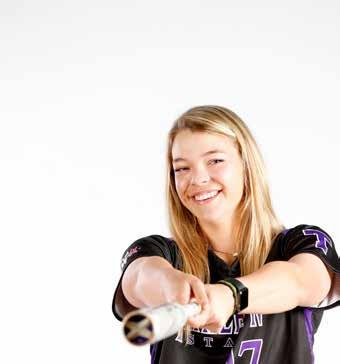
Aruptured appendix cost Tarleton State University bareback rider Tyler Berghuis two rodeos during the 2017-18 regular season.
It just made him tougher.
Now, he answers to “national champion” after finishing atop the leader board at the College National Finals Rodeo in Casper, Wyo., in June.

Berghuis, a 22-year-old from Atwater, Minn., turned in a 78-point ride in the opening round, then hit 80 or better on each of his last three rides in his first appearance at the CNFR.
The senior agriculture industries and agencies major won three of four rounds, including championship finals to become the 27th individual event champion in the history of Tarleton’s storied rodeo program.
His dominance at Casper led Tarleton’s men’s team to second place. The men accumulated 650 points, finishing 100 behind Panhandle State for the team title.
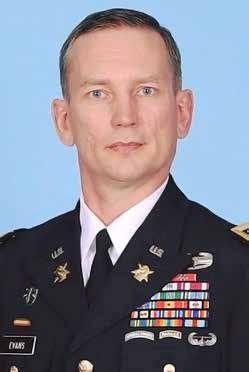
R etired U.S. Army Lt. Col. Lee H. Evans has been selected assistant commandant of Tarleton State University’s Corps of Cadets.
A Mineral Wells native, Evans retired in 2016 after more than 22 years of military service. He served in U.S. Army Special Operations while on active duty, leading soldiers, sailors, airmen and marines across five continents and more than 35 countries.
Early in his military career, Evans was platoon leader of the Army’s prestigious 3rd United States Infantry Regiment — The Old Guard — at Fort Myer, Va., conducting special ceremonies in the nation’s capital. As commander of the Joint Information Support Task Force in Qatar, he led a troop of 300 that provided trans-regional support throughout the U.S. Central Command, monitoring the effectiveness of military information support at six embassies in the Middle East.
He also served as commander of the only active-duty military information support battalion to the U.S. Africa Command, integrating operations in U.S. embassies in Djibouti, Nigeria, Mauritania, Mali and Kenya. While at Fort Bragg, N.C., he led no-notice combat operations — unconventional warfare, direct action, special reconnaissance and foreign internal defense — in support of the U.S. Southern Command.
Dr. Mike Leese was appointed vice president of Tarleton State University’s Division of Student Affairs, effective June 18. He will serve until his retirement at the end of 2018.
Leese started his Tarleton career in 1969, fulfilling a variety of capacities, including nine years as vice president for student affairs, before accepting a position at Texas A&M University, then serving as associate vice president and dean of students at Southwestern University in Georgetown. He returned to Tarleton in 2012 as executive director of student affairs development.
Leese holds a bachelor’s degree in political science and a master’s degree in public administration from Tarleton. He earned his doctorate in higher education administration from Texas A&M University.
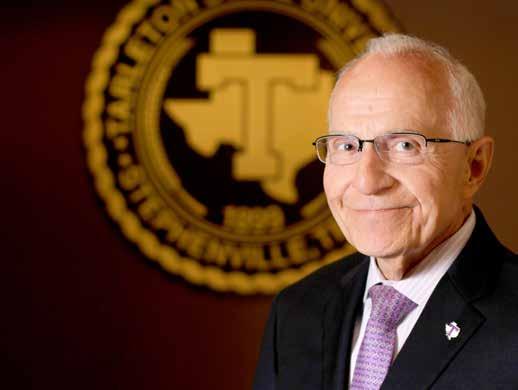
Leese and his wife, Sena, are actively involved in the Stephenville

community, especially with her leadership in Backpack Buddies of Erath County as well as with the First United Methodist Church. They have two grown children, Brad and Noelle — who spent much of their childhood on the Stephenville campus in two houses where the Honors Hall now stands — and three grandchildren.
Need more information?
Check out these resources.
For information about enrolling at Tarleton, go to tarleton.edu/welcome
Discover ways to give back to your university at tarleton.edu/giving
Check out the latest sports stats and information at tarletonsports.com
Reconnect with old classmates at tarleton.edu/ alumniassociation
For everything else, go to tarleton.edu Chat with us! facebook.com/ tarletonstate Tweet us! @tarletonstate Follow us! TarletonState
Beginning fall 2018, students will be able to earn an affordable bachelor’s degree in engineering technology that awards credit for past vocational training and coursework at a community college or technical school.

Tarleton will offer three new Bachelor of Applied Science degrees in manufacturing engineering technology, mechanical engineering technology, and construction science and management.
The degrees build upon existing degrees, allowing community college and transfer students to more easily apply credit from vocational training and technical education. Doing so will enable them to complete a bachelor’s degree more quickly. The program also helps meet the demand in Texas and beyond for a trained workforce in science and engineering-related fields.
Number of seats expected on the new home side of Memorial Stadium after construction is complete 423
Number of diplomas awarded at the August commencement ceremonies 4
Number of Tarleton students elected to the 12-member Texas FFA Association state officer team
Dr. Jesse Meik, assistant professor of biological sciences at Tarleton State University, has made a rare discovery of two species of rattlesnakes native to the Gulf of California.

Only about a half dozen new species of rattlesnakes, including the most recent two, have been discovered in the past century.
“Our findings are significant because most new rattlesnakes are simply elevated from subspecies to species status, but these two species were previously completely unknown to science,” Meik said.
The research has significant implications.
“Accurately describing and cataloging the world’s biodiversity is fundamental to our understanding of the history of life on Earth,” Meik explained. “In addition, different species of snakes show variations in venom properties, and those components have been used to synthesize new and powerful pharmaceuticals.”
Meik’s discovery has been documented in the Journal of Natural History .

The leader of Tarleton State University’s College of Education has been named an Impact Academy fellow, joining a cohort of national leaders committed to strengthening educator preparation.

Dean Jordan Barkley will participate in the yearlong fellowship, which is a venture of Deans for Impact, a national nonprofit organization that aims to improve student learning by changing the way the country prepares educators.
Barkley is one of 13 educators selected for the fellowship following a rigorous nomination and application process. This is the third cohort of fellows selected since the program launched in summer 2016.
The fellowship combines intensive in-person sessions with ongoing support, mentoring and individual learning. Fellows kick off the year with a four-day academy, then extend their learning throughout the year with individual modules and ongoing leadership coaching from Deans for Impact members.
A professor of counseling at Tarleton State University, she arrived from Wisconsin in 1992 and fell in love with the people and the close-knit atmosphere.
Thus her purple hair.
“I like to say it’s my natural purple,” joked Albrecht, who colors her hair at a local salon.
Albrecht is recognized around town as the professor with purple hair. Occasionally she tries out another color, but she always returns to her signature hue.
Purple hair is only part of her persona.
Students and colleagues also know Albrecht for her love of cats. When she and her husband, Dr. Dennis Jones, a professor in Tarleton’s College of Business Administration, adopted their first cats years ago, students threw her a “cat shower” and gifted her with cat toys and treats.
Over the years, the gifts kept coming. She has received cat pins, cat beanie babies, cat clothes — “every possible cat trinket you can imagine.”
Today, she and Jones have two cats. Delta is 7 and ruler of the household. Chi, 10, was a stray when students found him outside the campus library one night in 2008. A student brought him to class, and Albrecht adopted him on the spot.
“Probably half of the university knew before I told my husband,” she recalled. “Dennis loves Chi dearly, even though he was the last to know about him.”
Albrecht and her husband are longtime Tarleton donors. As first-generation college students, they wanted to find a way to help other students.

That same desire pushed her to pursue a career in counseling. Albrecht initially taught junior high, but she kept visiting the school counselor to discuss problems students faced.
“When I was a little kid, my mom told me I better get a job where I get to talk to people all day,” she said. “I realized I was a counselor at heart.”
And her heart is at Tarleton.
“I am the crazy cat-loving, purple-haired professor,” she said. “It’s who I am.”
Dr. Sally Lewis has been named interim dean of Tarleton State University’s College of Health Sciences and Human Services.
Tarleton added the College of Health Sciences and Human Services — its sixth college — in fall 2016 to better serve almost 2,000 students enrolled in already successful, established programs in medical lab sciences, public health, social work, counseling and nursing. The college offers programs at its Stephenville campus as well as outreach centers in Fort Worth, Waco and Midlothian and via its online Global Campus.
A full professor, Lewis has brought in more than $1.2 million in grants and donations to support Tarleton’s medical lab and public health programs, creating scholarships and maintaining state-of-the-art teaching laboratories for faculty to provide students with realworld experiences. Her emphasis on faculty and student scholarly pursuits within the department resulted in award-winning research and multiple grants.

Dr. Thomas J. Faulkenberry, assistant professor of psychological sciences at Tarleton State University, has been appointed to a three-year term on the newly established review committee for the international Psychonomic Society.

The Psychonomic Society fosters the science of cognition through the advancement and communication of basic research in experimental psychology and allied sciences.
Faulkenberry was named a fellow by the society in 2014, recognizing his significant contributions and accomplishments in the field of experimental psychology. In his new role, he will review graduate travel award applications for the society’s annual meeting and provide advice on special academic awards, grants, programs and initiatives.
Faulkenberry joined the faculty of Tarleton’s Department of Psychological Sciences in 2013. He holds a bachelor’s degree in mathematics from Southeastern Oklahoma State University, a master’s in mathematics from Oklahoma State University and a doctorate in psychology from Texas A&M University-Commerce. As an active researcher, he has published more than 20 papers on numerical cognition, mathematical modeling, the psychology of mathematics learning and Bayesian statistics.
Tarleton’s Dr. Amber Bozer feels your pain.
More accurately, she runs a lab to help understand and ultimately ease it. Bozer, an assistant professor in the Department of Psychological Sciences, heads the university’s neurological research facility, a lab she created and has nurtured for two years.
“The lab is a behavioral neuroscience lab,” she explained. “We have some electrophysiological components, like our EEG (electroencephalogram) equipment. What that means is we take a problem and we piece apart the behavior going on in the nervous system and we tell a story. The story in our lab is about chronic pain.”
Bozer and her staff of three graduate and three undergraduate students have doubled the scope of the lab’s chronic pain research just in the last year.
Tracy Brown is one of the lab’s graduate student researchers. He looks to earn his master’s in applied psychology in 2019.
His plans for a Ph.D. now revolve around what he has learned in the lab.
“We live in a day and age where technology supersedes everything in the type of advances going on,” he said. “Since I started in the lab, I really have taken an interest in neurotechnology. It’s kind of marrying the fields of neuroscience, learning all the functions of how neurons work so you can interpret that into actual applications of psychology.”
When the lab opened in 2016, researchers had a 10-electrode EEG. Since then, they have added a state-of-the-art, 24-electrode model.
Electrodes are placed on a subject’s scalp to record activity in different areas of the brain. More electrodes mean more areas are covered and more data is gathered.

“We’re doing more because we now have twice the equipment,” Bozer said. “The number of students I can mentor is directly proportional to the availability of equipment. When we doubled our equipment, we doubled what our lab can do.”
Bozer, a Tarleton grad, was motivated to create the lab when she joined the faculty after working at the University of Texas at Arlington.
“I came back here because I wanted to bring neuroscience to Tarleton,” she said. “I wanted
to do that and share my research and contribute to the next chapter of pain literature.”
Her area of study is becoming increasingly relevant, making it highly fundable. Going out five to 10 years, she hopes to receive funding from organizations like the National Institutes of Health or the National Science Foundation to further expand the reach of the lab.
Until then, she has more immediate plans for the facility.
“I am aspiring to acquire more physiological equipment like for a galvanic skin response to measure heat conductions across the skin. We also have EKG (electrocardiogram) equipment in the lab we haven’t fired up, so we’re looking to put that to work.”
Her goals extend past the lab, even beyond her own department.
“I’m thinking about growth in the lab, but also beyond, in the university. Similarly sized universities don’t usually have neuroscience programs or researchers. I’d like to see that balloon out of this research as well.”
Researchers at Tarleton’s neuroscience lab recently concluded their first rounds of studies since the facility was created two years ago. Dr. Amber Bozer, who directs the lab, and her team of six graduate and undergraduate researchers are now collecting data gathered from an electroencephalogram in subjects dealing with chronic pain.

“We’re about halfway through data collection on two studies,” Bozer said. “These studies have so far demonstrated that individuals who have chronic pain actually avoid pain stimuli in their environment less, which surprised us.
“We’re seeing a widespread decrease in activity across the brain in individuals as they make decisions about how they approach their pain.”
Even as her team gathers information on these first efforts, Bozer, an associate professor in the Department of Psychological Sciences, has already charted two new, highly relevant studies.
“We want to see how opioid use affects that same inhibition. We have a lot of people using opiate-based drugs for pain treatment. We know that opioid use does cause some inhibition on the brain, so we wanted to know if that explained the effect we found.”
The Tarleton researchers have noticed that chronic pain with or without opioid use results in a similar amount of inhibition, leading them to the early belief that the pain drives the decrease in brain activity, not the opiates.
The other study they’ve taken on questions whether cannabis results in a similar inhibition.




“It’s too early to talk about interaction yet,” Bozer said, “but we did replicate the inhibition we saw in previous studies with the pain group, and we did find some additional activity in the folks reporting cannabis use.”

As the study grows, the researchers hope to examine the interaction between chronic pain and cannabis and point either to a similar amount of brain activity inhibition or a combination effect on decision-making.
With a pair of projects done and two more ongoing, the lab’s next steps are becoming clearer.
“The future reveals itself as we go,” Bozer said. “We’re trying to catch up on applied physics, calculus, to fill in some of the holes. We are kind of one foot in front of the other.”






It wasn’t love at first sight. But the more naturalist Seth Hamby studied the rare Comanche Peak prairie clover he found nestled in a rocky glade near Weatherford, the more smitten he became.

awarded him the Ann Miller Gonzalez graduate research grant of $2,000 to support his study.
A member of the pea family, Comanche Peak prairie clover is a low-growing herb with purple spikes of flowers on sparsely leaved branches. Its seven to 11 leaflets distinguish it from other Dalea species. Hamby’s research includes next-generation genetic sequencing and sampling to determine soil requirements for the clover.
Growing up in rural South Carolina led Hamby to a love of the outdoors that blossomed into a passion for natural resource conservation and preservation of biodiversity. He volunteered with the Botanical Research Institute of Texas for two years, planted a permaculture garden at the AgriLife Research and Extension Center in Stephenville, and founded and now leads Prairie Oaks Master Naturalists, who established the Bosque River Trail Nature Center along the river.
He hopes his research will result in recognition of Comanche Peak prairie clover as an endangered species and further an appreciation for its significant drought-tolerant genetics. After graduating in December, Hamby intends to continue his education in plant and fungal taxonomy diversity and conservation at the Kew Royal Botanical Gardens (London, England) or in botany at Oregon State University.
“Everything I’m doing is aimed at fostering appreciation for the natural world and educating people in natural resource conservation,” he said. “If people don’t love and appreciate nature, they’re not going to care. Creating and nurturing that passion in people is my life’s goal.”
The hardy plant faces myriad challenges, from drought to development and predation. What’s not to love?
“There’s something really moving about what that tiny plant has been able to survive — struggling to exist and evolving in such a harsh habitat,” Hamby said of Comanche Peak prairie clover, which is so scarce it only occurs in limestone habitats in eight counties in North Central Texas. “It has a long taproot so it can reach water, and it’s just amazing that it persists.”
Hamby is conducting research, analyzing data and writing his thesis on the prairie clover to earn a master’s degree in agriculture and natural resource science from Tarleton’s Department of Wildlife, Sustainability and Ecosystem Sciences. The Native Plant Society of Texas recently



Heather Bushart saw pieces of life scattered along roadsides in Rockport, Texas. Abandoned bicycles. Electric toy cars. A teddy bear wearing a pink tutu. “It was heartbreaking,” said Bushart, a junior at Tarleton State University. “Everywhere you looked, there were reminders of life before.”
Bushart was one of about a dozen Tarleton students who traveled to Rockport in spring 2018 as part of a crisis communications course offered by Dr. Cessna Winslow, an assistant professor of communication studies.

Hurricane Harvey devastated Rockport in 2017, slamming into the South Texas coastal town and causing catastrophic damage. Rockport was described as ground zero and is still recovering today.

Winslow was watching the news coverage when an idea came to her for a course that would wed hands-on instruction and service.
“I knew we needed to find a way to embrace this teachable moment,” she said.
A longtime public relations professional, Winslow had experience with both crisis communications and disaster relief. The course seemed a perfect fit.
Winslow had co-led a team of college students from the Ohio university where she previously taught to provide disaster relief after Hurricane Katrina, and her own childhood home was badly damaged in an earthquake in 1971.
“I can remember what it’s like to be homeless and temporarily fostered because of nature’s wrath,” she said. “I understand what it means to start all over and be dependent on the charity of strangers.”
With the support of Dr. Lora Helvie-Mason, assistant dean of the College of Liberal and Fine Arts, Winslow crafted a semester-long course to explore the dynamics and strategies of crisis communications.
Students studied communications processes, analyzed social and ethical implications, discussed the roles of media, relief agencies and first responders, and learned effective communication techniques.
A trip to Rockport during spring break served as the course capstone.
While there, students toured hurricane-ravaged neighborhoods and the town’s Emergency Operations Center, met with the mayor and other community leaders, talked with residents and volunteered with Samaritan’s Purse, a nonprofit, to rebuild homes.

Dr. Jim Gentry, associate professor of education, also accompanied the group.
As part of the course, the students created publishable projects, including photo exhibits, feature articles and documentaries, to detail their experiences. Topics ranged from how small businesses were affected to the homeless pets left in Harvey’s wake. (Winslow and a student each adopted an abandoned dog, one of which is now named Harvey.)
Kendyl Weatherly, a junior communications studies major, created a documentary about the volunteers’ experiences.
Before the trip, she had never given much thought to the difficulty of crisis communications. She recalled the mayor telling the communication students to turn their phones off. Now, he told them, imagine that you have to communicate with the whole town that they need to evacuate.
“It was eye-opening,” Weatherly said. “We learned the importance of one voice, one message. Rumors can spread fast in disasters.”
Working with another student, Bushart created a photo story, “Foundations of Hope,” documenting residents’ struggles to rebuild.
“Every day we saw a lot of brokenness, but I never felt broken at the end of the day. I felt rejuvenated,” Bushart said. “The people we met were hopeful. That was my biggest takeaway. There was hope everywhere.”
Thanks to the interest, Winslow plans to offer the course again next spring.


Nestled along 11,000 acres of pristine Texas prairie, Rough Creek Lodge is a lavish getaway just 30 miles from Stephenville. That, and a training ground for communication studies students at Tarleton State University.
Student interns are working at the five-star resort in public relations, event planning, social media and marketing, conference management and culinary arts.
Dr. Cessna Winslow, assistant professor of communication studies, helped develop the partnership between Tarleton and Rough Creek Lodge. “This is a win for the students, a win for Rough Creek and a win for the university,” she said. “It is a partnership that makes sense.”
Students apply for the internship to Winslow, who prescreens applicants and sends the finalists to Rough Creek, which is just outside Glen Rose. She seeks students who are self-starters, reliable and teachable.
The interns work as part of the staff at Rough Creek. They attend staff meetings, learn the nuances of the high-
end hospitality business and are responsible for ensuring guests have a positive experience.
General Manager Paul Boccafogli, who has worked at Rough Creek since it opened in 1998, said the students quickly learn what is expected.
“If you want to provide a five-star level of service, you have to have a five-star attitude,” he said. “That is the key from the moment they walk in the doors.”
A handful of interns have even landed full-time jobs at the resort.
Taylor Green worked as an intern in fall 2017, helping run the resort’s social media accounts. When she graduated from Tarleton last December, Rough Creek hired her as assistant manager for weddings and social events. She was promoted to manager shortly after that.
Green now oversees more than $1 million in annual sales at Rough Creek and is working to increase the lodge’s wedding business.
“As a college student, it was an incredible opportunity to work at a place like Rough Creek,” she said. “You cannot get that kind of experience in a classroom.”
Daniel Jones lived life full throttle, devoted to the things he loved. Facing health challenges at a young age only made him more passionate about Tarleton, its traditions and the university’s pep bands, where he marched and played baritone.
During class his senior year in 2016, Daniel suffered a seizure and died at age 22. As their grieving subsided, his parents, Paul and Carolyn Jones, knew exactly where they would invest his remaining college funds.
They endowed a scholarship in their son’s memory that enables students to join Tarleton’s marching band and basketball pep ensemble known as “Foul Play.”
“‘Bleed purple’ was Daniel — it epitomized him. Everything he did was about school spirit at Tarleton; he wore his ball cap with a purple T all the time,” Carolyn said. Her husband added:

“He didn’t like the idea that students couldn’t afford the bands. Making it possible for any kid to join in was important to Daniel.”
Daniel Jones seen here as a member of Tarleton's marching band, The Sound and The Fury.

Six students have already benefited from the Daniel Jones “Bleed Purple” Memorial Scholarship. Some of them knew Daniel, and his parents have received thank-you letters from all of them.
“This scholarship is our son’s way of continuing to help people,” Paul explained. “What better way to honor him. We feel good about it; Daniel’s legacy lives on. He lived the last five years of his life passionately loving Tarleton.”
The Joneses shared their experiences with Cheryl Baca, who lost her 22-yearold daughter, Jacey Smathers, to carbon monoxide poisoning last year. Jacey was a nursing student at Tarleton who recently started her clinical training.
“Jacey was a ‘bucket filler’ who would take care of other people or animals before taking care of herself,” Cheryl said. “That’s just who she was. Nursing was the perfect occupation for her because it allowed her to help others.”
Establishing the scholarship was a big decision for Jacey’s mom, who admits that her thoughts in the days following Jacey’s passing weren’t the clearest. The scholarship provided an opportunity for family and friends to express their love and respect.
“I never dreamed her scholarship would be endowed so quickly. The fact that so many people contributed and continue to contribute shows how many people loved Jacey. I am so grateful.”
Cheryl asked that recipients of Jacey’s memorial scholarship show the same passion for helping others that drove her daughter. Two nursing students vetted by the nursing faculty have received the scholarship.
Jacey Smathers was a bucket filler who would take care of other people or animals before herself.
“Nursing was Jacey’s chosen career and Tarleton her chosen university,” Cheryl said. “This scholarship will keep Jacey alive through other students who share those passions and encourage them to help others, too.”

Contact the Office of Development Box T-0415, Stephenville, TX 76402 (254) 968-9769
Continuing a loved one’s legacy of compassion is a common goal among surviving family and friends who establish memorial scholarships at Tarleton. Three close friends of Scott Riola’s initiated such a scholarship in his honor after the 29-year-old Tarleton graduate died in April 2017.

Scott was working his dream job as a medical flight nurse on his way to pick up a critically ill patient when his plane went down shortly after takeoff in Amarillo. His wife, Melissa Limmer-Riola, said the scholarship established by Scott’s friends, along with other tributes to him, give her comfort and hope.
“Scott has been memorialized and honored all over the country, and I’m so proud to have a scholarship in his name at Tarleton. It’s amazing to know he impacted so many people, and I hope he is remembered for a very long time.”
Tarleton graduate Scott Riola was living his dream as a medical flight nurse.
Helping cope with illness, grief and poverty came naturally to Don Cawley during his 50-year career in social work. Before he died this year of cancer, Don knew that his wife, Dr. Darla Beaty, who teaches at Tarleton, planned to establish a memorial scholarship in his name for social work students.
“Don applied his intellect to bettering other people’s lives and leaving something behind for humanity,” explained Dr. Beaty, assistant professor of social work at Tarleton-Waco. “He thought it was a wonderful idea to help the next generation of social workers in Texas who are giving back to their communities.”
Darla prefers that Don’s memorial scholarship benefit lowerincome students at the Tarleton-Waco campus, where they often are the first in their families to attend college. Don worked his way through school, so he understood the need for financial aid.
“Striving to be a premier student-focused university plays out in reality at Tarleton,” Darla said. “And scholarships are a wonderful way to help students achieve their educations and dreams.”

“I will be the first person in my family to graduate from college and pursue a career in nursing. I’m proud of this accomplishment and thankful for individuals who have stood behind me financially and supported my journey.”
Tarleton State University’s alumni, faculty, staff and friends understand it takes significant and continued private financial support to transform generations through a high-quality education. These contributions help students expand their horizons, pursue their passions and prepare for a career. Every gift, regardless of size, makes a big difference. Lives are changed. The world becomes a better place.
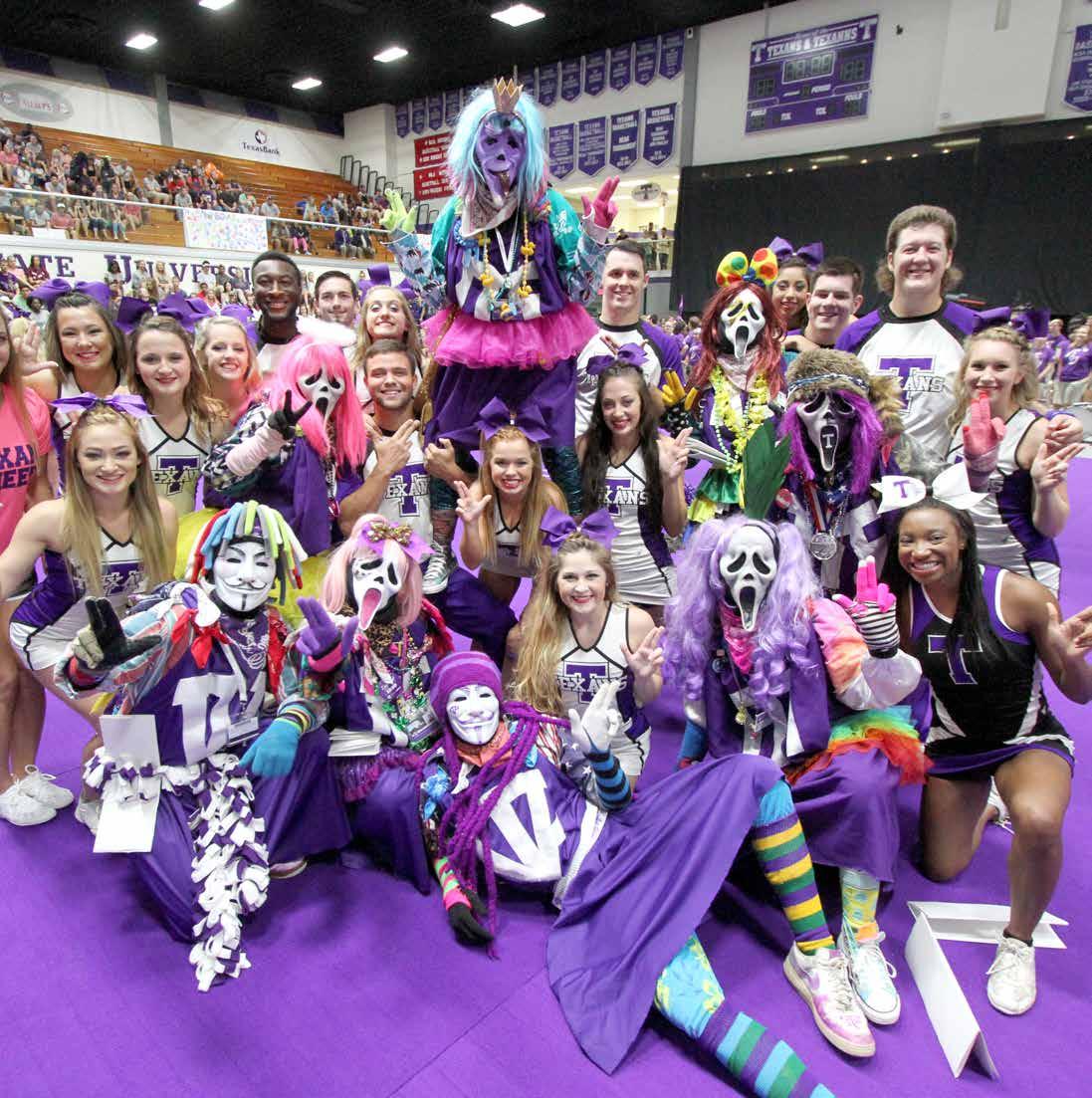
KAYLYN A. College of Health Sciences and Human Services
Tarleton alumni who give back to the university cast a vote of confidence in their alma mater, demonstrate their Texan pride and ensure a bright future for upcoming graduates.

Alumnus Dr. Alfonso “Alfie” Pino is paying it forward with a gift to the College of Science and Technology to support pre-health professionals.
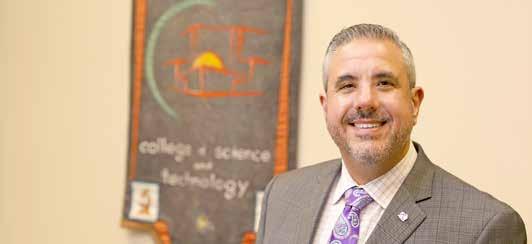
“I am very thankful for the education I received,” he said of his bachelor’s degree in biology. “My time as a Tarleton Texan prepared me for the success I enjoy today. Giving back is the right thing to do.”
Pino continued his education at the University of Texas Southwestern Medical School and now is an anesthesiologist in Dallas.
Judith Meador, her son and mother created a second endowed scholarship to honor her grandfather — Daniel B. McMillin — who moved his family of eight to a farm in Erath County just so his six children could attend college at Tarleton. When his middle daughter, Glynda (Judith’s mother), graduated from high school in 1930, McMillin went to the bank and borrowed $100 to fund her two years at Tarleton, where she studied home economics.
“We’re a family of four who all have master’s degrees and believe in helping graduate students,” Meador said. “My grandfather would be proud that his children, grandchildren and great-grandchildren have gone to college. Youth and education are the hope of this country.”
Gifts from alumni like Dr. Pino, the Meador family — and you — sustain the university and bolster the value of a Tarleton degree. They are investments in the university and the students and faculty who will shape the future of North Texas and beyond.
“My parents dropped out of school to raise my siblings and me. I grew up watching them work jobs they hated. Thanks to help from donors, I’ll graduate from Tarleton and someday watch my son, who’s 3 now, do the same.”
TONI M. College of Liberal and Fine ArtsTarleton is home to a dynamic faculty community of highly talented and devoted educators, mentor-scholars and researchers who challenge students to grow intellectually and personally.
Gifts for faculty enhancement, research and professional development — or to endow a faculty professorship — help attract these top scholars, making Tarleton a first-choice university by some of the brightest minds in the world.

Tarleton has two endowed faculty positions, but more are needed for the university to meet critical needs in Texas health care and other fields. The state is calling for universities to prepare more professionals in business and engineering, and private support is crucial.
Private gifts to Tarleton that are earmarked to support faculty enhance the academic experience for students and raise the university’s competitiveness. When faculty are free to concentrate on their teaching and research instead of funding proposals, students excel and enrollment, retention, four-year graduation rates and national rankings all increase.
Professor Dustin Edwards and a class of Tarleton biology students are knee deep in isolating never-before-identified bacteriophages that have the potential to treat diseases in humans. Part of a national initiative by the Howard Hughes Medical Institute, this unique research opportunity for first-year students has resulted in the discovery of 16 phages.
Dr. Jesse Meik, assistant professor of biological sciences, has discovered two species of rattlesnakes previously unknown to science. Only a half dozen or so new species of rattlesnakes have been discovered in the past century. It’s a significant finding, considering that snake venom is often used to synthesize new and powerful pharmaceuticals.
Ongoing research by Dr. Eunsung Kan focuses on technologies to recycle cow manure and wastewater to produce fertilizer and electricity in a way that is environmentally responsible and doesn’t increase operational costs for producers.
Private gifts also help improve and construct campus facilities.
In fall 2019, Tarleton will open the first building of its planned 80-acre campus along the Chisholm Trail Parkway in Fort Worth. Land for the campus was donated by a privately owned real estate and investment group.
Philanthropy — from big donations by private companies, to small gifts from many people — underpins a quality education and the dedicated faculty who share their expertise and experience with the students who’ll change the world.
Professor Dustin Edwards, far left, and his students are working to identify bacteriophages that have the potential to treat diseases in humans.

“My family never had the ‘extras’ to feel financially secure or help pay for college for me or my siblings. My goal is to work in private sector finance, assisting families with investment services so they have a better life. After I graduate, I’ll be able to give back financially to those deserving and in need of assistance. Thanks for assisting me with funds for my education and filling the gap.”
AVERY F. College of Business AdministrationWhile Tarleton receives state funding, it is not the sole source of revenue. Private support is needed to create scholarships, fully develop academic programs and provide transformational learning experiences outside the classroom.
Tarleton students have the intellect and determination to earn a university degree, but many are short on funds.
Like the young man who showed up with less than $100 in his pocket and most of what he owned in a cardboard suitcase. Maj. Gen. James Earl Rudder became a star athlete on Tarleton’s football team, a coach, a U.S. Army hero revered on two continents, a respected state elected official and eventually chancellor of The Texas A&M University System.
None of it would have happened without financial help.
Eighty percent of Tarleton’s more than 13,000 students face challenges in funding their education and require some sort of financial assistance. Almost 60 percent are first-generation students, making a university degree life changing for them, their families and generations to come.
Private gifts sustain scholarships that students don’t have to pay back, ensuring a robust economy as emerging leaders graduate to take their place in the professional workforce.
Scholarships allow students to focus on academic excellence without taking on multiple jobs or sinking into debt from loans.
Financial gifts help veterans and active military personnel — their families, too — with tuition, fees and a host of services unique to those who ensure America’s freedom.
Private donations keep Tarleton’s Food Pantry stocked so students can concentrate on their coursework instead of hungry stomachs. A Career Closet provides professional attire for job interviews. Other dollars enrich an emergency fund to help students with an unexpected crisis complete their degree.
Donors also give to the President’s Circle, the Deans’ Circles, Student Life Circle and the Tarleton Fund, all of which invest in underfunded or unbudgeted opportunities campus-wide, filling gaps that enrich the student experience.
Some friends of the university choose to support specific academic programs, research or applied learning experiences that happen over breaks or between semesters.
Study abroad trips, to almost everywhere imaginable, provide international study annually for students. These trips equip students with skills to excel in a global economy and an appreciation for cultures different from their own.

Philanthropy at Tarleton helps students in so many ways. And student success is paramount to a better world — the best return on investment anyone can ask.

In their drive to conserve natural resources for future generations, Texas’ 552 game wardens often patrol alone in remote locations, where they protect endangered wildlife, apprehend poachers, enforce fishing laws, patrol public waters to keep boaters safe, and perform numerous other law enforcement duties.
“It’s the nature of the job to be inherently dangerous,” said Maj. Tracy Davis, chief of training at the Texas Game Warden Training Center near Hamilton. “We’re out in all types of weather, often at night. Game wardens have much more diverse job duties than we did when Texas created the job in 1895.”
Those duties vary geographically but include search and rescue, disaster relief, drowning victim recovery and border patrol. Since 2012, Davis, a staff of 11 and visiting instructors have educated 169 Texas game wardens at the 200-acre training center.
Davis graduated from Tarleton in 1983 with a bachelor’s degree in business administration. The center’s assistant chief, Capt. Craig Hernandez, and two training lieutenants also are Tarleton alumni.
“My heart is still out in the field,” Davis said; he worked for 20 years in the Panhandle and Brown County. “But everything we do here at the training center supports field operations. Our training is progressive, but at the same time we’re honoring our legacy.”
As chief of the training center, Davis uses skills acquired at Tarleton to manage personnel, create and follow a budget, and organize tasks. He remembers the support of a professor who reached out and counseled him through his education. Today he follows what he learned and mentors the cadets he recruits.

Davis’ passion for hunting and fishing led him to his 32year career as a Texas Parks and Wildlife game warden. Now he nurtures the next generation of wildlife guardians so Texans can always take refuge in the state’s natural beauty.
In July, 23 game warden cadets and seven park police cadets graduated from the training center. Four of them are Tarleton graduates.
“I tell our cadets that we’re all walking on layers of game wardens who have come before us,” Davis said. “And I want them to safeguard that legacy of conservation, do things honorably, serve fearlessly, and make us proud.”
“ My heart is still out in the field, but everything we do here at the training center supports field operations. Our training is progressive, but at the same time we’re honoring our legacy. ”
Maj. Tracy Davis
Kelly Francis did not plan to major in mathematics. She was sitting in an algebra class at Tarleton State University when a professor asked if she’d like to stick around for free pizza and a Math Club meeting.
Free pizza proved too big a lure. “I left that meeting a math major,” Francis said with a laugh. She graduated from Tarleton in 1999.
Almost 20 years later, Francis heads two high-level missile defense programs at Raytheon, the Exoatmospheric Kill Vehicle and the Multiple-Object Kill Vehicle.
Kill vehicles destroy long-range ballistic missiles in space. Launched atop missiles, the vehicles use sensors, lenses and rocket thrusters to pick out warheads and steer into their path.
Francis, who lives and works in Tucson, Ariz., is responsible for planning, execution and oversight, including customer communications, budgeting and quality and mission assurance. As program manager, she travels the world meeting with customers, suppliers, engineers and production workers.
“I show up to work every day knowing that what I do helps keep our warfighters and nation safe,” she said. “There is so much pride in what we do here every day. It’s hard not to get out of bed in the morning with a bounce in your step.”
This is Francis’ latest role in a 20-year history with Raytheon, which she joined in 1999. Previous jobs have included systems engineer, operations research analyst and instructor to warfighters.

Tarleton and a math background helped Francis hone her critical thinking, problem-solving and leadership skills,
“ I show up to work every day knowing that what I do helps keep our warfighters and nation safe. There is so much pride in what we do here every day. It’s hard not to get out of bed in the morning with a bounce in your step. ”
Kelly Franciswhich she said are key to work for Raytheon, where about 200 people are under her office.
Francis never imagined the places a mathematics degree would lead. She has launched missiles in the desert, climbed aboard a naval ship to integrate a weapon system and briefed senior military leaders in the Pentagon.
“Don’t let the title of your degree limit you,” she advises young people. “Follow your passion. If you find something you enjoy, find a way to pursue it. And go on lots of adventures. You should be having fun.”
Jeff True discovered two things as a Tarleton student.
Hard work and a love for horses.
He came to the university as a cowboy. He’d worked at cattle ranches during his summers in high school and had shown cattle for a few years.
But it was his time in Tarleton’s horse production program that led him to his passion and his career.
That’s where the hard work came in.
In the summer between his junior and senior years, an area ranch donated a dozen pasture-bred yearlings so Tarleton students could get hands-on experience in breeding and managing horses.
“I knew then that’s what I wanted to do,” says True, now general manager at Ruidoso Downs Race Track in New Mexico. “That was the toughest year of my life.”
Between classroom obligations and work with the university herd, True accumulated enough hours on the job to tackle an internship at an Oklahoma stud farm, followed by a job buying and selling thoroughbreds in California.
Tarleton’s horse production program had an advisory board that introduced students to industry professionals. This fact alone, True said, gave him his career.
Program head Dr. Lester Waymack and the late Dr. Don Henneke had worked at commercial breeding farms prior to their time at Tarleton, with industry connections that added a dimension to the educational experience.
“I felt well prepared, between the professors, the exposure to the business and the actual hands-on horsemanship,” True recalls. “We sale-prepped yearlings from The Waggoner Ranch, and we sold horses from the university ranch — horses we bred, raised and foaled. That gave me a pretty good foundation in the business.”
After graduating, True spent four years in the thoroughbred trade in California and later worked in group sales at the iconic Santa Anita Park before serving as executive director of the Oklahoma Quarter Horse Racing Association and then the Texas Quarter Horse Association.

Now he has returned to a familiar site in Ruidoso. Having sold horses there in the 1980s and ’90s, he knew the surroundings when the new Ruidoso Downs owners asked him last summer to become general manager. He also spent 14 years as president or vice president of three different horse racing-related technology companies. He said those leadership experiences and global exposure were integral in his career.
“Jeff rose to the top fairly quickly,” partner Stan Sigman said, speaking for the group that runs the venture. “While all our partners are accomplished businessmen with extensive experience in the horse industry, none of us have any experience in the very complex business of operating a racetrack.”
True credits much of his success in equine ventures to his training at Tarleton.
“The quality of the campus, the quality of the education, is clearly the biggest draw,” he said. “Being a part of The Texas A&M University System has advantages, too.”
His daughter recently became the second member of the family to earn a Tarleton degree. A software project consultant in the home healthcare industry, Courtney True graduated in 2014 with a bachelor’s in agriculture.
“I have nothing but good memories of Tarleton,” her dad said. “I really had a good time there, and my education proved to be the right one.”
Shelbi Tidwell has a clear memory of the cowboy boots.
They were a gift from her parents. The tops were orange, the toes skinny and square; they almost resembled riding boots.
She was 12, and she hated them.
“You’re so picky,” her mother told her. “You should just design your own.”
So that is exactly what young Shelbi would grow up to do. A 2016 Tarleton State University alumna, Tidwell is now a product developer and designer for Justin Brands, an American western and equestrian footwear company headquartered in Fort Worth.

“My mom’s words stuck with me,” she said. “Something clicked, and I knew this was what I wanted to do.”
Tidwell spends her days designing boots for the Justin lines Tony Lama and Nocona, traveling to shows and markets around the world, sketching ideas, meeting with clients and vendors, and researching new materials.
Among her designs are personalized boots for celebrities including Reba McEntire, Garth Brooks and Trisha Yearwood.
Tidwell tries to incorporate a modern retro or new vintage look into her designs. When people wear her boots, she wants them to feel right .
“A boot should always be comfortable. That is the first test. I want people to feel good about themselves when they wear my designs.”
Tidwell herself has about 25 pair of cowboy boots, but she does have a favorite. The first pair she ever designed, made of alligator skin with turquoise and purple stitching, is tucked into her closet.
“They are too special to wear,” she said.
At Tarleton, Tidwell majored in family and consumer sciences with a focus on fashion design. She credited her professors for allowing her to explore western fashion design, which helped her land an internship with Justin Brands as a student.
After graduation, the company hired her full time.
“My professors believed in me and helped me get to where I am right now. They were so incredibly awesome in letting us pursue our own interests and dreams.”
Tidwell hopes to continue designing boots for years to come.
“Cowboy boots will always be a timeless classic, like blue jeans,” she said. “Everyone can wear them. They’ll never go out of style.”
A dream come true for Tarleton alumna
“ My professors believed in me and helped me get to where I am right now. They were so incredibly awesome in letting us pursue our own interests and dreams. ”
Shelbi Tidwell
’72, MARK TROSTLE, B.S. in general agriculture, has been named vice president of global regulatory affairs for Concentric Ag Corporation. Trostle is an expert in federal, state and international regulations for crop inputs. He most recently directed global registrations and regulatory affairs for Nutrien Retail, where he managed federal and state pesticide registration; state registration of fertilizer, plant nutritional, seed and adjuvants; and international pesticide, plant nutritional and adjuvant registration in 60 countries. Prior to joining private industry, he spent more than 31 years in various positions at the Texas Department of Agriculture.
’84, MICHELE STEVENS, M.B.A. , was promoted to executive vice president of marketing and advertising for First Financial Bancshares. Stevens joined First Financial in 1985 and served the company in various marketing, public relations and training roles for five years. She rejoined First Financial in 2000, serving in an operations capacity until 2003 when she began her leadership role in marketing and advertising. She was promoted to senior vice president of marketing and advertising in 2006.
’92, DR. TOD ALLEN FARMER, B.A. in business administration, was selected president of Weatherford College. Farmer became chief of staff to Tarleton President F. Dominic Dottavio in August 2017. Prior to that, he served as head of the Department of Educational Leadership and Policy Studies. Farmer joined Tarleton in 2006 following a successful career with the Springtown Independent School District.
’94, TODD ALEXANDER, B.A. in exercise and sports studies, has been named head football coach at Waxahachie. He is in year 21 with the Waxahachie Independent School District, where all but the last two years were spent as a football coach at either the junior high or high school. During his time as a football coach, Alexander served as an offensive coordinator and, most recently, the running game coordinator in 2015.
CLINT ASKINS, B.A. in education, was named superintendent of Miles Independent School District. An educator for more than two decades, he previously served as director of special education at Floresville ISD. Originally from Big Spring, Askins has been a principal at school districts in Mason, Veribest and Junction.
JEREMY MUELLER, B.S. in exercise and sports studies, has been named head baseball coach at Midland High School. Mueller comes from Class 4A Taylor where he spent the last five seasons. In that span he went 106-45 and led the Ducks to the playoffs each year, reaching the area round three times. In his 12 seasons as a head coach, Mueller has compiled a record of 217-106.
CHRIS JOSLIN, B.A. in physical education, is the new athletic director and head football coach at Coahoma High School. For the past two years, he has been the offensive assistant football coach for the Rockdale High School Tigers. Joslin was an assistant at Big Spring for 10 years prior.
THEODORE CLEVENGER, B.A. in education, was named principal of Teague High School. Clevenger came to Teague from Normangee where he served as both high school and middle school principal for four years.
’03/’11, JOE ALCORTA, M.S. in education and ED.D. , was selected Dalhart Independent School District Superintendent. Alcorta, worked in the Abilene ISD for 26 years, most recently executive director of human resources. He also served as the district’s director of personnel and was principal at Mann Middle School, Wylie Intermediate School and Wylie High School. He began his career in Abilene in 1992 as a computer literacy teacher.
MARVIN WILLIAMS, M.S. in human resources management, has been appointed vice president of property management for MidPen Housing Corporation in California. Williams leads more than 250 employees and oversees all aspects of property operations including lease-ups, training, facility maintenance and financial performance. With nearly 20 years of experience, he most recently worked for Progress Residential in Arizona where he successfully directed operations for a portfolio of 23,000 homes across 14 states.
’04, LEE ALLEN TIPTON, B.S. in criminal justice, was promoted to deputy chief of police with the Conroe Police Department. He joined the department in 2004. Tipton also worked for the Texas Department of Criminal Justice and for the Onalaska Police Department.
’05, ED HUSK, M.ED. , is Cleveland Texas
Independent School District Principal of the Year. Principal at Northside Elementary School, he has been with Cleveland ISD for five years.
JEROD WOMACK, M.ED. , was named athletic director for the Stephenville Independent School District. For the past three years, he has served as athletic director and head football coach at Jim Ned High School in Tuscola.
ADAM CRAWSHAW, B.S. in criminal justice, is a partner in his law firm, Crawshaw & Simpson, PLLC in San Antonio, Texas. Crawshaw graduated from Appalachian School of Law in 2010. Crawshaw practices criminal defense, DWI defense, and select civil litigation all across Texas. Crawshaw has handled cases in over 40 Texas counties and has tried over 20 cases to a jury. He is a member of the Top 100 National Trial Lawyers Association, Texas Criminal Defense Lawyers Association, San Antonio Criminal Defense Lawyers Association (Board Member), and the San Antonio Bar Association. He is licensed to practice in Texas and Federal Court for the Western District of Texas. Crawshaw is married to Lauren Crawshaw, and they have one daughter.
DAVID MANLEY, M.ED. , has been chosen assistant superintendent of instructional leadership services for the Killeen Independent School District. Manley is a 31-year veteran educator who served as a teacher, coach, principal and executive director overseeing schools. He has served Killeen ISD as executive director of secondary leadership since July 2015. During 2014-15, he served as executive director of athletics for the district after having served three years as principal of Harker Heights High School.
’07, AMY VILLASENOR, B.S. in kinesiology and exercise science, was promoted to head track coach at Laredo United High School. Her promotion came after one season as assistant coach for the Lady Longhorns. She was a three-time state medalist at Sanford-Fritch High School and earned a track scholarship to Tarleton to become a five-time All-American in the 400-meter hurdles and part of the 1,600-meter relay team.
’08, MARY PERKINS, M.ED. , is the new principal at Breckenridge Junior High School. She has been the principal at Gilbert Intermediate School with the Stephenville Independent School District since July 2014. Before that, she was the assistant principal at Mineral Wells High School and assistant principal at Travis and Lamar elementary schools in Mineral Wells. She also taught sixth grade and first grade in Mineral Wells.
ALLISON MOORE, B.S. in agricultural services and development, was chosen Gilmer High School Teacher of the Year. She graduated from Tarleton as the Outstanding Agricultural Services and Development Graduate with high honors after completing her student teaching at Gilmer. Moore started her teaching career at Daingerfield High School as an agricultural science teacher, returning to Gilmer in 2010.
JAMES ROGERS, B.S. in kinesiology, is the new head coach of the Keiser University volleyball team. Prior to coming to Keiser, Rogers spent a season as the head coach at Southeastern Community College. He also coached at NCAA Division II Salem International for three years, two as head coach. A League City native, Rogers has spent more than 12 years coaching in the national level club circuit, serving as a college recruiter for more than five volleyball organizations.
COREY HICKERSON, M.B.A. , was named principal at Buffalo Texas High School. He joins Buffalo after serving as principal at Rice High School. He served as a principal at Blooming Grove Elementary for a year and was an assistant principal at Life High School in Waxahachie for two years. Before becoming an administrator, Hickerson was a teacher and coach for five years. He taught and coached at Rowlett, Arlington-Bowie and Corsicana.
BRENT BIBLE, B.A. in business administration and management, has joined Farmers and Merchants Bank as vice president of the Eastland Banking Center. Bible will use his banking and market knowledge to help grow consumer and business relationships for Farmers and Merchants.
Send your alumni and class updates to Tarleton State University Box T-0730, Stephenville, TX 76402 media@tarleton.edu | (254) 968-9460
To update your mailing address , contact Advancement Services ebouquet@tarleton.edu | (254) 968-9948
Memorial Stadium, home of the Tarleton State University football and track teams, is undergoing a massive facelift.
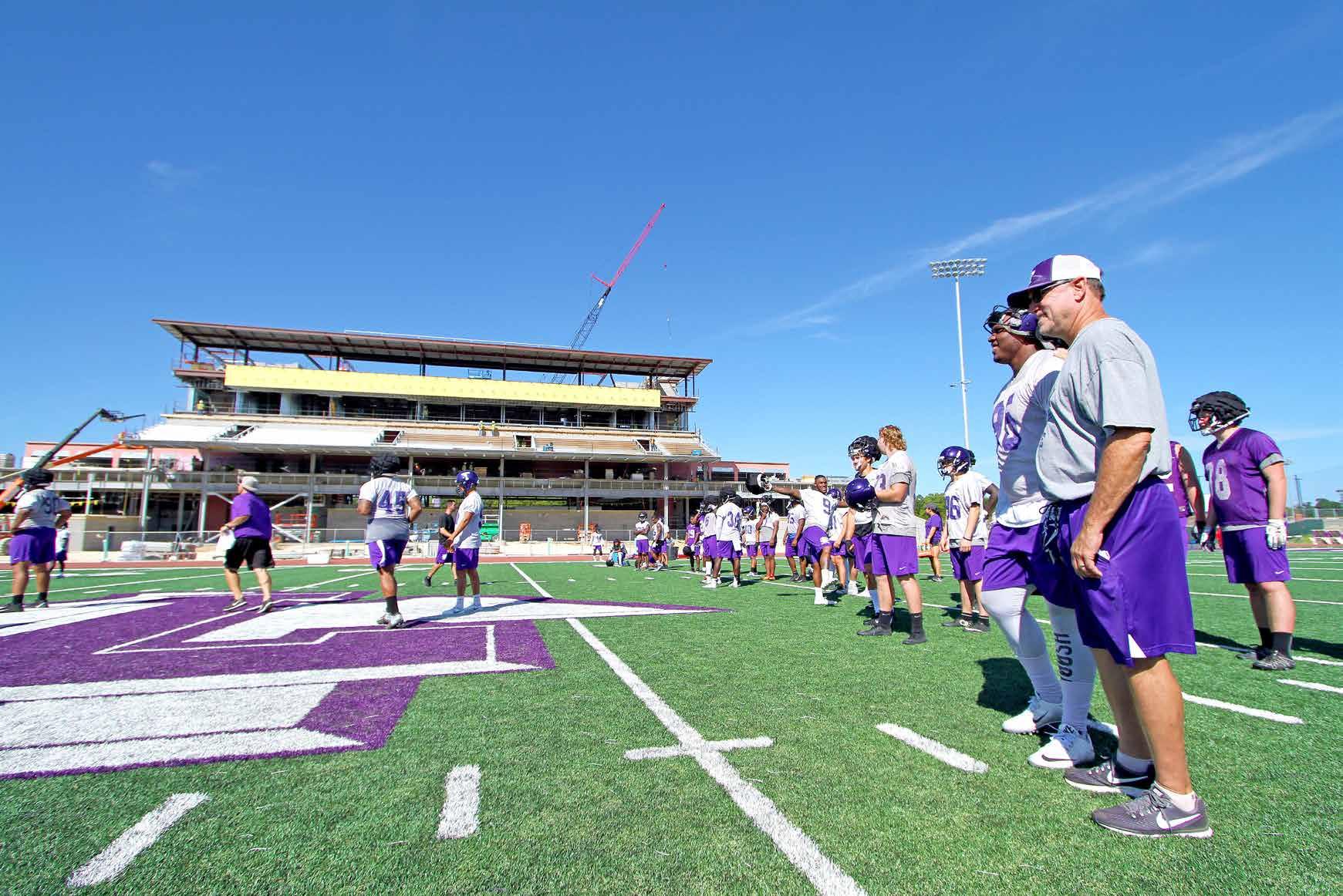
The $26.4 million project will boost seating to close to 10,000, improve entrances and concession areas, enhance press facilities, add a new playing surface, and change the long-standing configuration so home fans won’t have to face the setting sun on Saturday afternoons.
“It elevates our program in a real way,” said head football coach Todd Whitten. “As far as the Lone Star Conference goes, this is going to be a one-of-a-kind place.”
The team’s new digs also should invigorate recruiting. “To have an elite facility, which is what this will be,” Whitten said, “will be huge when we bring guys on campus.”
In the late 1940s, university leaders, including President E.J. Howell, formed a committee to raise $100,000 to erect the original stadium, named for 179 former students and faculty members who died in World War II.
The building opened in 1951 with room for 6,000 spectators on 32 rows of steel bleachers. Upgrades in 1977 and again in 1988 provided the iconic east-side berm and a press box, and eventually expanded capacity to 7,600.
“It’s also going to be good for our community,” said Whitten, noting that
Stephenville High School plays its home games there. “It’s going to be a great addition all around for Tarleton and for Stephenville.”

Texan Noah Perez, a junior offensive lineman, grew up in Stephenville in the shadow of the stadium and played there for the hometown Yellow Jackets.
“It was always big to me,” he said. “It was a huge thing when we stepped on the field as Yellow Jackets. There was always a lot of anticipation for the things that were going to happen at the stadium.”
Senior linebacker E.J. Speed went to high school at North Crowley. As a player in Texas Class 5A he saw lots of stadiums, but he never played in Stephenville until he donned the purple and white.
He’s excited about the inspiration he and the team should derive from the new facility.
“It’s a motivational tool,” he said. “Every time a change like this comes, you feel like you have
to prove yourself that much more. We want to use that motivation to protect our house, our new stadium, our home field advantage.”
The upgrades began last summer. Completion is expected following the 2018 football season.
“It’s been talked about for a few years,” Whitten said. “To have the construction going on and to look forward to the completion this fall, I know there’s excitement from everybody. To see all of the improvements in the facilities throughout campus makes it an exciting time to be at Tarleton.”
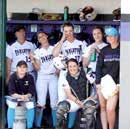
 BY PHIL RIDDLE
BY PHIL RIDDLE
Here’s a thought for Lone Star Conference softball coaches who have to face Tarleton the next three years. TexAnn super freshman Georgia Capell is working to improve.
She’s not satisfied earning LSC Freshman of the Year honors, being named a finalist for the Schutt Sports/National Fastpitch Coaches Association National Freshman of the Year award, and claiming the NFCA South Central Region Freshman of the Year honors.
Oh, and she earned a spot on the All-America team, too.
Capell finished the regular season with the fourth-most home runs in the league and set a single-season record for home runs by a freshman with 17. She hit .397 with 53 RBI, sixth most in the conference.
For her, that’s still not enough.
“You want to get better every year,” she said. “I try to make my hitting game more all-around. Instead of just hitting for power, I’m trying more ways to get on base.”
She began her athletic career playing baseball at the age of 4, then switched to softball when she was 8.
“I’ve been doing it nearly my whole life. When I started I was the only girl on the team. It was fun trying to show up the boys.”
A designated player from Midlothian, where she also played volleyball and tossed the shot and discus, Capell was a highly valued recruit. Even so, it was an easy sell for Tarleton softball coach Mark Cumpian. By her junior year in high school, she had already decided on Tarleton.
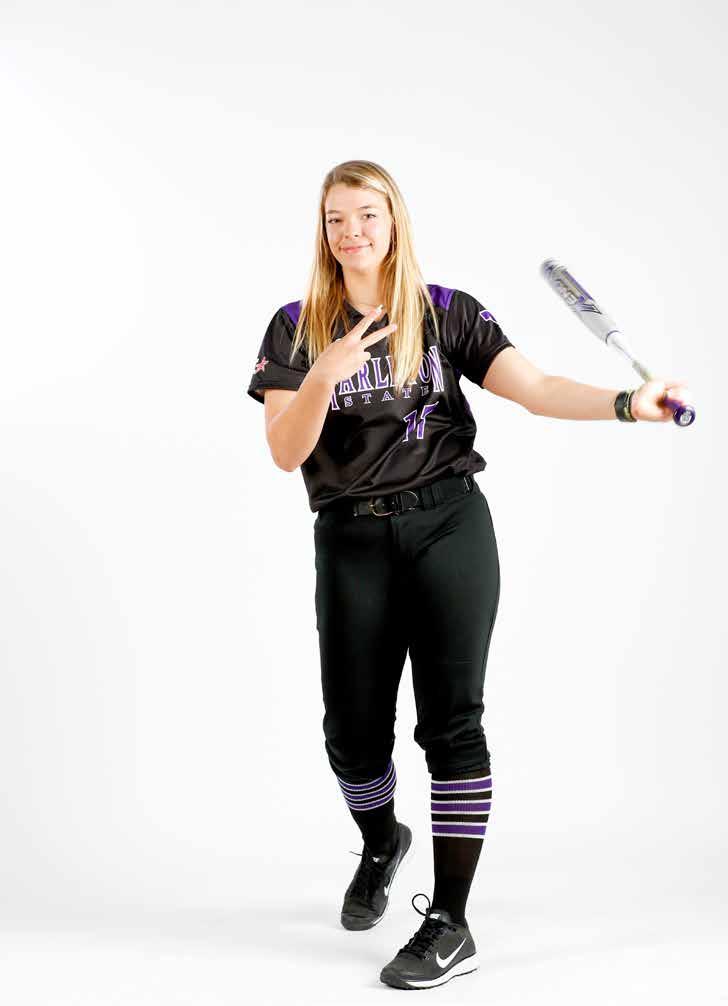
“The sky is the limit for her,” said Cumpian, who’s about to start his third campaign in purple. “I think year two is the hardest year as a player since everybody knows what you can do. We, as coaches, have to help her expand her game and make her better.”
“I look at one specific spot on the bat, take a deep breath and let it out. Then go hit. I try to take that moment and slow it down so it doesn’t get overwhelming.”


Capell is a kinesiology major who intends to graduate in 2021 and work in occupational therapy. She’s happy with her decision to be a student-athlete in Stephenville.
“Tarleton feels like home,” she said. “The coaches are really great here. They make me feel welcome and wanted. They are passionate about what they do. It’s fun to be here.”
Despite making it look easy, there were obstacles to navigate as a first-year collegian. “In college, winning is a lot more fun and losing is a lot harder. And playing 61 games last year, it’s a longer season. The rewards are really nice, though.”
Those rewards included a 50-11 record in 2018 and a trip to the regional finals for the TexAnns, just the second time in program history they have advanced so far.
“Obviously, she’s a great athlete, but people forget we have a lot of women of great character,” Cumpian said. “She leads by example. We don’t get freshmen like this often.”
Look alive, opponents.
Georgia Capell may just be getting started.

“
The people I’ve become friends with seem to be more genuine. I like spending time with them, especially my teammates.”
“ David Ortiz of the Boston Red Sox. He really made me fall in love with the game. I grew up watching the Red Sox with my dad, and David Ortiz was one of the guys I looked up to.”

I have two: ‘The Benchwarmers’ and ‘White Chicks.’”
FAVORITE MUSIC “ I like country, but I listen to some hip-hop.”





Box T-0570 Stephenville, TX 76402 (254)968-9000 | www.tarleton.edu
What a difference four years make. This view from the top of the Lamar Johanson Science Building shows one of the new pedestrian walkways called Rudder Way. It was previously known as Vanderbilt Street. Rudder Way was named after Maj. Gen.James Earl Rudder, a Tarleton alumnus, a decorated World War II hero and chancellor of The Texas A&M University System.

A section of Honors Hall is the old residence hall that was originally called Co-Ed and later changed to Traditions Hall. The new Honors Hall boasts 446 beds and 60,000 square feet of amenity space.
